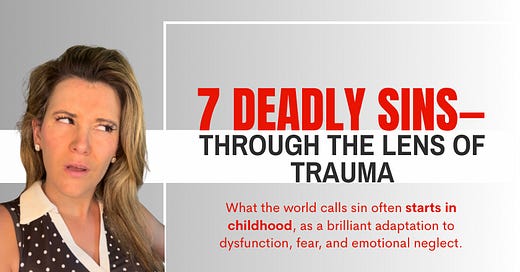We’ve been taught to see them as moral failings.
Proof of weakness.
Evidence of something broken in us.
But what if they were never sins at all?
What if pride, greed, lust, envy, gluttony, wrath, and sloth weren’t signs of corruption—but clues?
Survival mechanisms, wired into us in childhood, to help us feel safe in a world that didn’t?
🔄 Reframing the 7 Deadly Sins as Trauma Responses🔄
Pride
When vulnerability is dangerous or used against you, pride becomes armor.
It’s not vanity—it’s survival.
If I seem untouchable, maybe I’ll be safe.
Greed
Not about stuff—about scarcity.
If love or security were unpredictable, hoarding what you could (money, affection, control) made the world feel just a little more stable.
Lust
Lust is the body’s way of chasing connection, worth, or power.
If nurturing wasn’t safe or consistent, attention might’ve been the closest thing to feeling wanted.
Envy
Envy is grief in disguise.
When others got what you needed—love, safety, care—it hurt not because you were petty, but because you were denied.
Gluttony
When connection’s out of reach, you turn to what’s available.
Food, things, stimulation.
It’s not greed—it’s an attempt to fill a space that was never supposed to be empty.
Wrath
Rage is what you grab when everything else feels unsafe.
It’s not just anger—it’s power, control, and protection when the world feels like too much.
Sloth
Sloth isn’t laziness—it’s collapse.
When your system has had enough, it freezes.
You’re not broken. You’re burned out from surviving too much, too long.
🎧 Ready to Go Deeper?
If this cracked something open—if you saw your own patterns reframed with compassion—you’re not alone.
This week on The Adult Child Podcast, I break down ACA Steps 4–7 through this exact lens.
These are the steps where we stop hiding, start telling the truth, and learn to let go—not with shame, but with self-compassion.
It’s not about fixing what’s broken.
It’s about understanding what was never your fault—and finally giving yourself what you needed all along.
🎙️Listen now: The Deep Reveal: From Survival to Self-Compassion (ACA Steps 4–7)





